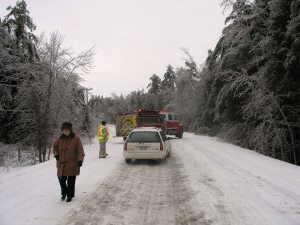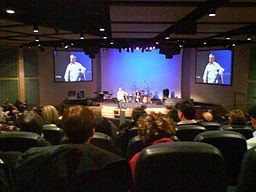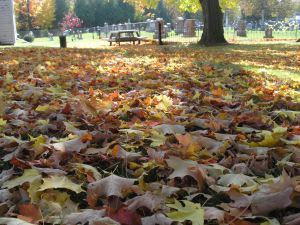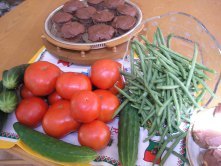Eric E. Wright's Blog, page 35
January 10, 2015
Conquering Winter Gloom
 In northern climes, darkness comes early. And when clouds obscure the sun, the gloominess of this period of the year can be depressing. Some of us succumb to SAD, Seasonal Affective Disorder and become seriously depressed.
In northern climes, darkness comes early. And when clouds obscure the sun, the gloominess of this period of the year can be depressing. Some of us succumb to SAD, Seasonal Affective Disorder and become seriously depressed.
How can we fight off gloom? Some of us can head south to a sunshine coast or board a cruise or fly to Figi. What if we can���t?
When I was a boy, I remember my mother varying our usual diet of white bread by giving us raison bread. The scattering of raisons made each bite a delight. In a similar way we can scatter special treats through our winter days to take our mind off the cold weather.
Keep busy. This is not the time of year to mope around the house lamenting the season. Of course, if you have a steady job or young children, much of your time will be occupied. But then there���s the weekend. Plan something fun for the whole family. And if retired, one has many other choices.
Plan a project or take a course. Winter is an ideal time to embrace that project we���ve put off. The more fun it is, the more it will distract us from weak sunshine. Take a course on photography, computers, memoir writing, or painting. Take action to do something you���ve always wanted to do. Before you know it, you���ll be wishing you had more time.
Volunteer. Every community needs volunteers; to visit seniors, deliver meals on wheels, drive people to appointments, taking shut-ins to the grocery store, the list is endless. Churches never have enough volunteers for their various ministries.
Plan fun things to do. Go to a movie, watch a hockey game, or take in a play. Play Scrabble. Set up a difficult crossword puzzle on a card table. Plan to have dinner or lunch in a special restaurant.
Encourage others. Call someone who needs a chat or prayer. Surprise people with a note or letter. Receiving real hand-written mail in this era of Facebook  and email has become rare.
and email has become rare.
Plan a special tea or meal with some friends, family, or even new acquaintances. It may spice up your life.
Read books. People who love books find that winter passes quickly. Join Goodreads (goodreads.com) where you can find what others are saying about books, keep a record of your own reading, and write short reviews.
Keep up your exercise. If you can, get out of the house regularly. Visit a mall, not to shop, but to get some exercise and have a coffee with a friend or spouse. Many places have community centres with a walking track and exercise machines. And take your vitamins, especially the sunshine ones.
Take a short-term missions trip. The needs in places like Haiti or Uganda and many other countries are unending. As a side benefit, these countries usually are warm and sunny while northern climes freeze.
Most important, adjust your attitude. Albert Camus wrote, “In the depths of winter, I finally learned that within me there lay an invincible summer.” How is that possible? Some will say all we need is positive thinking. But Christians rely on more than will-power. They trust in God to transform their attitudes���to everything, even winter. In Christian hearts, spring and summer can continually bloom when we allow the Holy Spirit full sway. ���The fruit of the Spirit is love, joy, peace, patience, ���self-control���(Gal. 5:22,23).
The Apostle Paul, who lived a life surrendered to the Holy Spirit could write, while shackled in prison, ���rejoice in the Lord always. I will say it again: Rejoice!���I have learned to be content whatever the circumstances���content in any and  every situation���(Phil. 4:4,11,12).
every situation���(Phil. 4:4,11,12).
Beyond doing whatever we can practically to add spice to our winter lives, we need to be much in prayer that the Holy Spirit would so work in us that we radiate joy and contentment in a winter environment.

January 3, 2015
A Blessing for the New Year
Some words have more power than others to touch us our hearts. ���I love you grandpa,��� not just from a young child but a grownup granddaughter or grandson. ���I forgive you,��� from someone we have hurt badly. ���I���ll love you forever and ever,��� from a spouse of 50 years.
 The Bible is full of powerful words, life-changing verses, comforting thoughts, soaring phrases, and liberating concepts. ���The Lord is my shepherd.��� ���Believe on the Lord Jesus Christ and you will be saved.��� ���I have loved you with an everlasting love.��� ���Come unto me.��� ���You must be born again.��� ���There is therefore now no condemnation.��� ���Now to the King eternal, immortal, invisible, the only God.���
The Bible is full of powerful words, life-changing verses, comforting thoughts, soaring phrases, and liberating concepts. ���The Lord is my shepherd.��� ���Believe on the Lord Jesus Christ and you will be saved.��� ���I have loved you with an everlasting love.��� ���Come unto me.��� ���You must be born again.��� ���There is therefore now no condemnation.��� ���Now to the King eternal, immortal, invisible, the only God.���
Tucked into an obscure chapter in Numbers we find a wonderful benediction. ���The Lord bless you and keep you; the Lord make his face shine upon you and be gracious to you; the Lord turn his face toward you and give peace���(Numbers 6:24-26). These words were to be used by the priests of Israel to bless the people.
The inimitable commentator Matthew Henry, from whom I gathered much that follows, makes application to our lives today. First, he urges us to individually prepare ourselves to receive God���s blessing. Without some heart preparation we may not be able to recognize God���s blessing nor enjoy to the fullest the happiness God wishes for each of us.

Winter Moon
The three-fold repetition of the name, LORD, or JEHOVAH���each of which���in the original, has a different accent, reflects a mystery solved only by the New Testament. This directs us to the blessing; ���May the grace of the Lord Jesus Christ, and the love of God [the Father, KJV] and the fellowship of the Holy Spirit be with you all���(2 Cor. 13:14). Each of the persons of the godhead is LORD, and each is bent on blessing us.
Just think, all the resources of the triune God are focused on blessing us. And yet we must not forget that we live in a fallen world where bad things happen. Only Jehovah can wrest good from bad.
These are powerful promises���not just words���promises of God acting for our actual blessing. While we may speak good words to one another and mean well, we don���t have the resources of heaven to effectually change things for each other. God���s words, however, express His intentional actions toward us. The fruits of God���s favor mean protection from evil through His keeping power; pardon for our sins through His grace and mercy; and peace through His indwelling Holy Spirit.

Snow scene
This benediction also promises that the Lord���s face will shine upon us and his countenance will be turned toward us. As the sun shines on the earth to warm and renew it, so the Lord causes us to know that he loves us. He smiles on us as a Father smiles upon his child. Such knowledge puts gladness into our hearts.
May 2015 be a year full of the blessings of God.

December 30, 2014
2014 in review
The WordPress.com stats helper monkeys prepared a 2014 annual report for this blog.
Here’s an excerpt:
A San Francisco cable car holds 60 people. This blog was viewed about 1,200 times in 2014. If it were a cable car, it would take about 20 trips to carry that many people.
Click here to see the complete report.

December 24, 2014
Christmas Traditions, Religious Ritual, and Christian Freedom
Most families have treasured Christmas traditions. The sending and receiving of Christmas cards. Buying Christmas gifts. Searching for and decorating the perfect tree. Attending the Christmas Eve Candlelight service. Gathering the  whole extended family together for a turkey dinner. But it must seem strange to those from other religious backgrounds that evangelical Christians have no rigid religious rituals that they must observe. This will be especially so for Muslim, Hindu, Buddhist, or Shinto friends for whom external rituals are prescribed. Our Orthodox, Ukrainian or Roman Catholic friends may even consider this lack of ritual as an erosion of faith. And for some this dearth of fixed traditions may indeed indicate disinterest or a lack of faith in the reality of Christmas. But to understand gospel freedom from ritual, we must consider the differences between the Old and New Testaments; the old and new covenants. Out of a pagan culture rife with superstition, human sacrifice, cruelty and oppression God called Abraham to be the progenitor of a purified people living in a just society���Israel. God gave to Moses the laws for this new nation. To remind them of the Lord���s centrality in national life, God gave them daily rituals, Sabbath rules, and 7 festivals which the people were required to keep: Passover, Unleavened Bread, Firstfruits, Weeks or Pentecost, Trumpets or Rosh Hashanah, Day of Atonement or Yom Kippur, and Tabernacles. To these festivals Jews later added a seven day long festival, Chanukah, to celebrate the rededication of the temple in 165 BC after its desecration by the Syrians. Clearly, obedience to law and ritual was mandated for those under the old covenant.
whole extended family together for a turkey dinner. But it must seem strange to those from other religious backgrounds that evangelical Christians have no rigid religious rituals that they must observe. This will be especially so for Muslim, Hindu, Buddhist, or Shinto friends for whom external rituals are prescribed. Our Orthodox, Ukrainian or Roman Catholic friends may even consider this lack of ritual as an erosion of faith. And for some this dearth of fixed traditions may indeed indicate disinterest or a lack of faith in the reality of Christmas. But to understand gospel freedom from ritual, we must consider the differences between the Old and New Testaments; the old and new covenants. Out of a pagan culture rife with superstition, human sacrifice, cruelty and oppression God called Abraham to be the progenitor of a purified people living in a just society���Israel. God gave to Moses the laws for this new nation. To remind them of the Lord���s centrality in national life, God gave them daily rituals, Sabbath rules, and 7 festivals which the people were required to keep: Passover, Unleavened Bread, Firstfruits, Weeks or Pentecost, Trumpets or Rosh Hashanah, Day of Atonement or Yom Kippur, and Tabernacles. To these festivals Jews later added a seven day long festival, Chanukah, to celebrate the rededication of the temple in 165 BC after its desecration by the Syrians. Clearly, obedience to law and ritual was mandated for those under the old covenant.  However, in the New Testament we search in vain for required rituals. There is nothing about how to celebrate Christmas, Easter, or Pentecost. We are free to innovate. Only two important ordinances���baptism and communion���are mentioned. Why this lack of prescribed rituals in the new covenant? Because external religiosity always fails to generate genuine devotion. God���s purpose in the old covenant was to demonstrate how external ritual and law is powerless to make us holy; is totally incapable of changing our fallen natures. Israel���s utter failure to keep the old covenant paved the way for something new. Jeremiah and Ezekieh saw this problem and predicted a new covenant: ���The time is coming, declares the Lord, when I will make a new covenant with the house of Israel…I will put my laws in their minds and write them on their hearts���(Heb. 8:8,10). Hebrews explains, ���By calling this covenant new, he has made the first one obsolete���(Heb. 8:13). Jesus came to introduce this new covenant, but in doing so repeatedly clashed with those who loved the external trappings of religion found in the old covenant. Jesus said, ���These people honor me with their lips, but their hearts are far from me. They worship me in vain; their teachings are but rules taught by men���(Matt. 15:8-9). ���Woe to you, teachers of the law and Pharisees, you hypocrites! You are like whitewashed tombs, which look beautiful on the outside
However, in the New Testament we search in vain for required rituals. There is nothing about how to celebrate Christmas, Easter, or Pentecost. We are free to innovate. Only two important ordinances���baptism and communion���are mentioned. Why this lack of prescribed rituals in the new covenant? Because external religiosity always fails to generate genuine devotion. God���s purpose in the old covenant was to demonstrate how external ritual and law is powerless to make us holy; is totally incapable of changing our fallen natures. Israel���s utter failure to keep the old covenant paved the way for something new. Jeremiah and Ezekieh saw this problem and predicted a new covenant: ���The time is coming, declares the Lord, when I will make a new covenant with the house of Israel…I will put my laws in their minds and write them on their hearts���(Heb. 8:8,10). Hebrews explains, ���By calling this covenant new, he has made the first one obsolete���(Heb. 8:13). Jesus came to introduce this new covenant, but in doing so repeatedly clashed with those who loved the external trappings of religion found in the old covenant. Jesus said, ���These people honor me with their lips, but their hearts are far from me. They worship me in vain; their teachings are but rules taught by men���(Matt. 15:8-9). ���Woe to you, teachers of the law and Pharisees, you hypocrites! You are like whitewashed tombs, which look beautiful on the outside  but on the inside are full of dead men���s bones and everything unclean���inside you are full of hypocrisy and wickedness���(Matt. 23:27). Very tough words. Clearly, obeying God���s law of love from heart and mind is the key to being a new covenant person. But the problem, as the whole Old������ Testament points out, has no human solution. ���The heart is deceitful and desperately wicked���(Jer. 17:9). For real devotion to occur, we need heart surgery and mental transformation. Jesus explained this to Nicodemus. ���No one can see the kingdom of God unless he is born again….of the Spirit���(John 3:3,5). Paul explained what being born again means to Titus. ���But when the kindness and love of God our Savior appeared [through Christ���s coming at Christmas] he saved us, not because of righteous things we had done, but because of his mercy. He saved us through the washing of rebirth and renewal by the Holy Spirit, whom he poured out on us generously through Jesus Christ our Savior���(Titus 3:4-6). The new covenant question is not have you kept the traditions but have you been
but on the inside are full of dead men���s bones and everything unclean���inside you are full of hypocrisy and wickedness���(Matt. 23:27). Very tough words. Clearly, obeying God���s law of love from heart and mind is the key to being a new covenant person. But the problem, as the whole Old������ Testament points out, has no human solution. ���The heart is deceitful and desperately wicked���(Jer. 17:9). For real devotion to occur, we need heart surgery and mental transformation. Jesus explained this to Nicodemus. ���No one can see the kingdom of God unless he is born again….of the Spirit���(John 3:3,5). Paul explained what being born again means to Titus. ���But when the kindness and love of God our Savior appeared [through Christ���s coming at Christmas] he saved us, not because of righteous things we had done, but because of his mercy. He saved us through the washing of rebirth and renewal by the Holy Spirit, whom he poured out on us generously through Jesus Christ our Savior���(Titus 3:4-6). The new covenant question is not have you kept the traditions but have you been reborn through the Holy Spirit? How does this come about? The instant, you or I, sincerely pray to God confessing our sins and believe in our hearts that Jesus died and rose again for our salvation, the Holy Spirit changes us from within. He creates a new heart that loves God and others. The work of transforming our lifestyle really begins. Jesus came at Christmas to establish a new covenant people who worship God from the heart. Sadly, we often tend to prefer ritual and law over heart devotion. When some of the early church leaders sought to re-impose the old covenant laws, Peter stood and said: ������Why do you try to test God by putting on the necks of the disciples a yoke that neither we nor our fathers have been able to bear���(Acts 15:10)? And so we find no Christmas or Easter rituals in the New Testament. A call to celebration and worship? Yes,! And a challenge to infuse everything we do with heart devotion to the glorious Triune God. Lord, with your help, may all our celebrations come from deep within.
reborn through the Holy Spirit? How does this come about? The instant, you or I, sincerely pray to God confessing our sins and believe in our hearts that Jesus died and rose again for our salvation, the Holy Spirit changes us from within. He creates a new heart that loves God and others. The work of transforming our lifestyle really begins. Jesus came at Christmas to establish a new covenant people who worship God from the heart. Sadly, we often tend to prefer ritual and law over heart devotion. When some of the early church leaders sought to re-impose the old covenant laws, Peter stood and said: ������Why do you try to test God by putting on the necks of the disciples a yoke that neither we nor our fathers have been able to bear���(Acts 15:10)? And so we find no Christmas or Easter rituals in the New Testament. A call to celebration and worship? Yes,! And a challenge to infuse everything we do with heart devotion to the glorious Triune God. Lord, with your help, may all our celebrations come from deep within. 

December 9, 2014
Forecasting Weather and Making Plans
 Our national weather service predicts a milder than usual winter. On the other hand, the farmer���s almanac warns of a very severe winter. Weather prediction is an inexact science. This is in spite of circling weather satellites, planes that fly through the eye of hurricanes, a century of recorded data, and a detailed understanding of high and low pressure systems. Earth is just too big, the sun too unpredictable, and variables too many to expect anything more accurate. Nevertheless, we enjoy generally helpful forecasts. We plan trips. We plant crops. We carry an umbrella or wear a parka. We buy ice-melting salt for our driveway. And when forecasters miss the mark, we can all have a field day blaming them. Such fun. Think for a moment about forecasting our lives, that is, making life choices based
Our national weather service predicts a milder than usual winter. On the other hand, the farmer���s almanac warns of a very severe winter. Weather prediction is an inexact science. This is in spite of circling weather satellites, planes that fly through the eye of hurricanes, a century of recorded data, and a detailed understanding of high and low pressure systems. Earth is just too big, the sun too unpredictable, and variables too many to expect anything more accurate. Nevertheless, we enjoy generally helpful forecasts. We plan trips. We plant crops. We carry an umbrella or wear a parka. We buy ice-melting salt for our driveway. And when forecasters miss the mark, we can all have a field day blaming them. Such fun. Think for a moment about forecasting our lives, that is, making life choices based  on what we think will happen. We expect our retirement funds to increase by x percent so we can plan a cruise next year without cutting into our equity. Then the market tanks. We schedule a picnic for Saturday but it rains. We start a business selling a hot commodity but its popularity wans and we lose our investment. We plan to drive to New York but our car packs it in. Fortunately, life is not quite so uncertain. (Unless we live in Iraq or Syria or the Ukraine.) We should plan. And when our plans go awry, we should pick ourselves up, adjust our plans and press on with perseverance. But there is a lesson here.
on what we think will happen. We expect our retirement funds to increase by x percent so we can plan a cruise next year without cutting into our equity. Then the market tanks. We schedule a picnic for Saturday but it rains. We start a business selling a hot commodity but its popularity wans and we lose our investment. We plan to drive to New York but our car packs it in. Fortunately, life is not quite so uncertain. (Unless we live in Iraq or Syria or the Ukraine.) We should plan. And when our plans go awry, we should pick ourselves up, adjust our plans and press on with perseverance. But there is a lesson here.
���Now listen, you who say, ���Today or tomorrow we will go to this or that city, spend a year there, carry on business and make money.��� Why, you do not even know what will happen tomorrow. What is your life? You are a mist that appears for a little while and then vanishes. Instead you ought to say, ���If it is the Lord���s will, we will live and do this or that.������(James 4:13-15).
James reminds us that it is arrogant to declare what we will do without qualifying it. It used to be much more common among Christians to write, dv, that is, Lord willing after declarations. We have come far in our modern world of engineered marvels and tech advances but we have not banished uncertainly and never will. God is the only one who knows with certainty what the weather will be tomorrow in Bongo Bongo or Boston. The Triune God, alone���Father, Son and Holy Spirit���knows your future and mine. No wonder, those who understand reality, have humbly prayed from the beginning of time for the Lord to guide them. ���The Lord is my shepherd…he leads me���(Ps. 23:1,2). ���Our Father in heaven���lead us not into temptation, but  deliver us from evil���(Matt. 6:9,13). Hundreds of years before Christ came, the Holy Spirit perfectly guided the prophets to predict the place of Jesus��� birth and scores of other facts. May the Lord guide you and I at this Christmas season. Let us entrust him with our futures.
deliver us from evil���(Matt. 6:9,13). Hundreds of years before Christ came, the Holy Spirit perfectly guided the prophets to predict the place of Jesus��� birth and scores of other facts. May the Lord guide you and I at this Christmas season. Let us entrust him with our futures.

December 2, 2014
Connected We Prosper
 The deciduous trees on our country property stand stark and bare at this time of year. With the lush foliage fallen, the inter-connected network of branches. From the tiniest twig, the frailest branch, to the main trunk all are exposed. The only part still hidden is the root system. Each tree is a vast inter-connected network of tiny passageways that carry life-giving sap to the farthest twig. Nutrients and water rise through the tree by capillary action. In the growth season the nutrients generated in the leaf-factories descend. The capillaries distribute what is necessary throughout each part of the tree. Cut off a twig or branch and that part of the tree dies. Like individual twigs, we humans, were not created to live isolated lives. We need connections with each other; in families, in villages, in towns, and cities. Who can live independent of farmers, pharmacists, doctors, carpenters, plumbers, snow-plow operators, school teachers, and the list goes on and on? Some have tried to live like hermits and become misanthropes, living twisted, selfish, miserable, pessimistic and cynical lives. The church, the body of Christ, by its nature is an inter-connected network of Christ-followers. ���The body is a unit, though it is made up of many parts; and though all its parts are many, they form one body.���If the foot sh
The deciduous trees on our country property stand stark and bare at this time of year. With the lush foliage fallen, the inter-connected network of branches. From the tiniest twig, the frailest branch, to the main trunk all are exposed. The only part still hidden is the root system. Each tree is a vast inter-connected network of tiny passageways that carry life-giving sap to the farthest twig. Nutrients and water rise through the tree by capillary action. In the growth season the nutrients generated in the leaf-factories descend. The capillaries distribute what is necessary throughout each part of the tree. Cut off a twig or branch and that part of the tree dies. Like individual twigs, we humans, were not created to live isolated lives. We need connections with each other; in families, in villages, in towns, and cities. Who can live independent of farmers, pharmacists, doctors, carpenters, plumbers, snow-plow operators, school teachers, and the list goes on and on? Some have tried to live like hermits and become misanthropes, living twisted, selfish, miserable, pessimistic and cynical lives. The church, the body of Christ, by its nature is an inter-connected network of Christ-followers. ���The body is a unit, though it is made up of many parts; and though all its parts are many, they form one body.���If the foot sh ould say, ���Because I am not a hand, I do not belong to the body,��� it would not for that reason cease to be part of the body���(1 Cor. 12:12,15). We can���t imagine a part of our body proclaiming its independence. Each part is absolutely necessary. And so it is in any community, especially in the church. We need each, very, very much. For encouragement. For ideas and inspiration. For prayer. For practical help in time of need. For skills and spiritual gifts. And we often need the challenge we give one another to participate in the extension of the kingdom. Sometimes, we just need each other for fun and fellowship. We often don���t recognize that mutual need. In the church, we may take our relationships for granted without really deepening our common connections. We may pass each other on Sundays, like ships passing in the night. We offer a nod, a hello, a how are you, without really expecting more than a socially acceptable, Good, thank you.
ould say, ���Because I am not a hand, I do not belong to the body,��� it would not for that reason cease to be part of the body���(1 Cor. 12:12,15). We can���t imagine a part of our body proclaiming its independence. Each part is absolutely necessary. And so it is in any community, especially in the church. We need each, very, very much. For encouragement. For ideas and inspiration. For prayer. For practical help in time of need. For skills and spiritual gifts. And we often need the challenge we give one another to participate in the extension of the kingdom. Sometimes, we just need each other for fun and fellowship. We often don���t recognize that mutual need. In the church, we may take our relationships for granted without really deepening our common connections. We may pass each other on Sundays, like ships passing in the night. We offer a nod, a hello, a how are you, without really expecting more than a socially acceptable, Good, thank you.  In a recent meeting, I asked people to pair off with someone they didn���t know well and find out at least one new thing about each other. They had so much fun chatting, it proved hard to get them to stop. In order for us to bless one another, which includes praying for one another, we need to foster these connections. That requires us to be interested in one other. Are we interested, indifferent, or desirous mainly of sharing our own story? If we give people a chance, we���ll find them very interesting. Let���s be curious about one another���not morbidly so. Let���s listen to one another and encourage one another. And let���s not monopolize any conversation. I���m certainly not claiming by this blog that I���m much of an example. I can be quite happy to stay at home, curl up with a book, or work on my computer. But when I have sought to deepen my understanding of others in our church or community, I have been really surprised and blessed.
In a recent meeting, I asked people to pair off with someone they didn���t know well and find out at least one new thing about each other. They had so much fun chatting, it proved hard to get them to stop. In order for us to bless one another, which includes praying for one another, we need to foster these connections. That requires us to be interested in one other. Are we interested, indifferent, or desirous mainly of sharing our own story? If we give people a chance, we���ll find them very interesting. Let���s be curious about one another���not morbidly so. Let���s listen to one another and encourage one another. And let���s not monopolize any conversation. I���m certainly not claiming by this blog that I���m much of an example. I can be quite happy to stay at home, curl up with a book, or work on my computer. But when I have sought to deepen my understanding of others in our church or community, I have been really surprised and blessed.
(Find out about my country books and suspense novels at http://www.countrywindow.ca)

November 21, 2014
Why Atheists Think Christians Are Arrogant
Here is an exceptionally clear and helpful post.
 Originally posted on A Christian Worldview of Fiction:
Originally posted on A Christian Worldview of Fiction:
 My post today is actually in response to a comment from an atheist on another site. We had a brief exchange of ideas, and in his last comment, he said I shouldn’t bother responding because he wouldn’t be reading on that thread any more. Then he repeated his charge that I, like other Christians, am arrogant.
My post today is actually in response to a comment from an atheist on another site. We had a brief exchange of ideas, and in his last comment, he said I shouldn’t bother responding because he wouldn’t be reading on that thread any more. Then he repeated his charge that I, like other Christians, am arrogant.
This individual isn’t saying anything I haven’t heard before, but it’s not a charge I’m willing to accept in the context he’s delivering it.
As it happens, I am arrogant—it’s a part of my sin nature which causes me to be deceived into thinking I’m better than I am, more truthful, more intelligent, more kind-hearted, more . . . you name it, and I’ve probably thought it if it puts me in a good light.
But that’s not the arrogance I, and other Christians, am being accused of. Rather, the idea is that because…
View original 973 more words


November 20, 2014
Spreading Sunshine not Gloom
 Originally posted on Country Inspiration:
Originally posted on Country Inspiration:
These November mornings I find myself taking longer to wake up and shake off the aches and pains of arthritic joints. I hobble down the hall into the kitchen, fumble with the coffee maker then collapse on my overstuffed armchair content to ease into the day slowly—very slowly. It’s downright annoying and quite humiliating. Where did the vigor and energy go that had me jumping out of bed to embrace a new da y while I sang the hallelujah chorus? Okay, maybe my memory is a bit cloudy here, especially when it comes to singing anything.
y while I sang the hallelujah chorus? Okay, maybe my memory is a bit cloudy here, especially when it comes to singing anything.
If I let myself, I could easily feel as gloomy as the yard outside the window looks. Leaves litter the grass. The flowers are shriveled husks. The deciduous trees are bare, except for some beech and oak whose leaves hang on longer. I face another day of November rain or early snow with four…
View original 318 more words


November 12, 2014
Fallen Leaves and Learning Patience
 Originally posted on Country Inspiration:
Originally posted on Country Inspiration:
November winds and rain have torn most of the leaves off our trees. The maples and aspens, the ash and ironwood stand stark and bare. Only the oak, beech and, of course, all the evergreens cling to their leaves.
 The fallen leaves will increase the humus that enriches the forest soil in the years ahead. A wise neighbour has a sign by the road, Leaves Wanted. He obviously understands the potential that too many of us waste. He must be a patient man.
The fallen leaves will increase the humus that enriches the forest soil in the years ahead. A wise neighbour has a sign by the road, Leaves Wanted. He obviously understands the potential that too many of us waste. He must be a patient man.
The production of humus and compost takes time, lots and lots of time. The production of character takes even more time—and patience. Sometimes we are too impatient with our children or with ourselves. Why am I making the same mistake again? Why haven’t I yet learned to trust God, to stop being anxious, to give thanks in every circumstance, or to know unshakeable peace?
Our impatience…
View original 349 more words


November 3, 2014
A Season for Aches and Aging?
 Summer and fall is a wonderful time of harvest. Apple season came as sweet corn season wound down. Some vegetables, like beans, carrots, cucumbers, and Swiss chard seem to do well throughout the summer and into the first weeks of fall. Other crops are short-lived: strawberries, cherries, blue-berries, and our own lettuce. Every year I look forward to real field ripened tomatoes which don’t become available here until late July. But the seasons quickly pass.
Summer and fall is a wonderful time of harvest. Apple season came as sweet corn season wound down. Some vegetables, like beans, carrots, cucumbers, and Swiss chard seem to do well throughout the summer and into the first weeks of fall. Other crops are short-lived: strawberries, cherries, blue-berries, and our own lettuce. Every year I look forward to real field ripened tomatoes which don’t become available here until late July. But the seasons quickly pass.
The wise author of Ecclesiastes tells us that “There is a time for everything, and a season for every activity under heaven…a time to be born and a time to die, a time to plant and a time to uproot…a time to weep and a time to laugh”(Eccl. 3:1,2,4).
This is certainly true of the seasons of the year. It’s also true of the seasons of life: childhood, youth, marriage, family, career, retirement. There is a time for leisure and fun. But a time for aches and pains, for wrinkles and balding, for sleepless nights? It’s called aging. No matter what creams and treatments we use, we can’t do more than disguise it. Oh, sure, the good health care we enjoy in the west and the nutritious foods we eat have contributed to putting it off a little longer. But aging is inevitable.
And yet aging is hard to accept. I look with nostalgia and a little envy at the energy of younger people; those who can play tennis with verve, hike all day, and climb mountains. Right on, I say. Enjoy it as long as you can. I used to walk fast, hike through dense bush and climb steep hills without pausing for breath. Now I have a replacement knee and a miscellany of other conditions—some rather benign, some more serious.
climb mountains. Right on, I say. Enjoy it as long as you can. I used to walk fast, hike through dense bush and climb steep hills without pausing for breath. Now I have a replacement knee and a miscellany of other conditions—some rather benign, some more serious.
There are always exceptional people who laugh in the face of aging. My jaw drops open when I watch some ninety-year old run a marathon. Along with everyone, I celebrate his or her achievement. But when a whole gamut of gurus imply that we could all share his health if only we subscribed to a certain regimen of supplements or exercise, I shake my head. Oh, is that so? Take this vitamin or that? Eat more kale? Can we really neutralize the effects of aging? Are we all nothing but the product of our lifestyle? Are there no differences between us? Can we really escape the inevitability of our DNA? Of course, the gurus are making lots of money pretending we can.
Sorry, I’m a skeptic. Now, I believe in eating nutritious natural foods including lots of fresh vegetables and fruit along with exercising as much as possible. I believe in postponing the inevitable as much as any. But! And this is a big but. There is also a time to accept the reality of our fragile humanity. The quicker we accept actuality, the happier we will be.
Why? Because we are fallen creatures, along with everything else in creation, creatures who have inherited decay and deterioration as a result of the space-time fall from innocence. With all creation we groan as we wait for Christ to return to remake our fallen world. “Our present sufferings are not worth comparing with the glory that will be revealed in us….the creation was subjected to frustration…in hope that the creation itself will be liberated from its bondage to decay and brought into the glorious freedom of the children of  God…we ourselves, who have the firstfruits of the Spirit, groan inwardly as we wait eagerly for our adoption as sons, the redemption our bodies”(Romans 8:18, 20, 21, 23).
God…we ourselves, who have the firstfruits of the Spirit, groan inwardly as we wait eagerly for our adoption as sons, the redemption our bodies”(Romans 8:18, 20, 21, 23).
So, instead of grinding our teeth in the face of the inevitable, let us lift up our eyes as we look into a future that is as bright as the promises of God—a future in which our body will be transformed like Christ’s body, free from pain and aging. And until that day, let’s accept the season we’re in.






